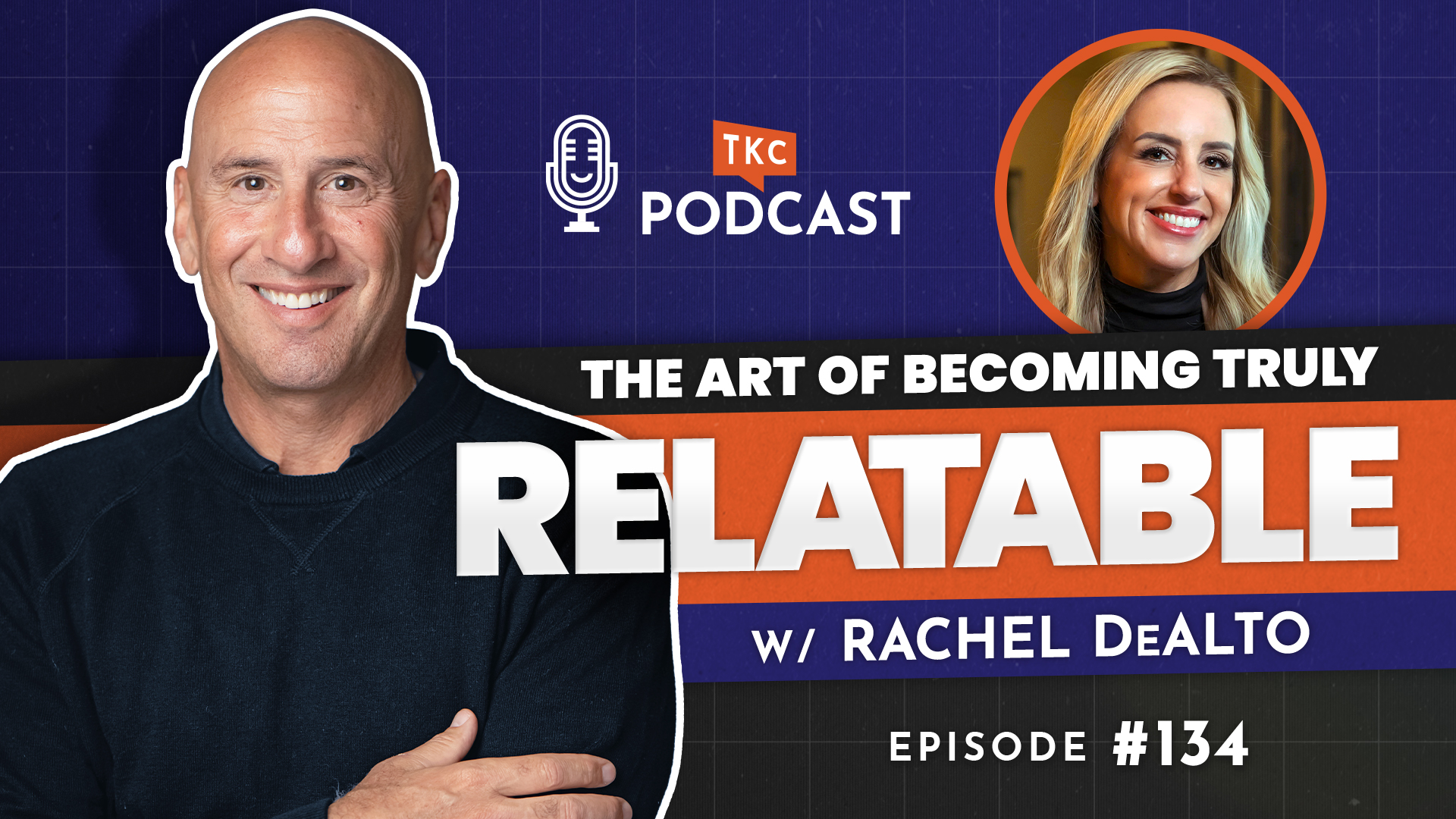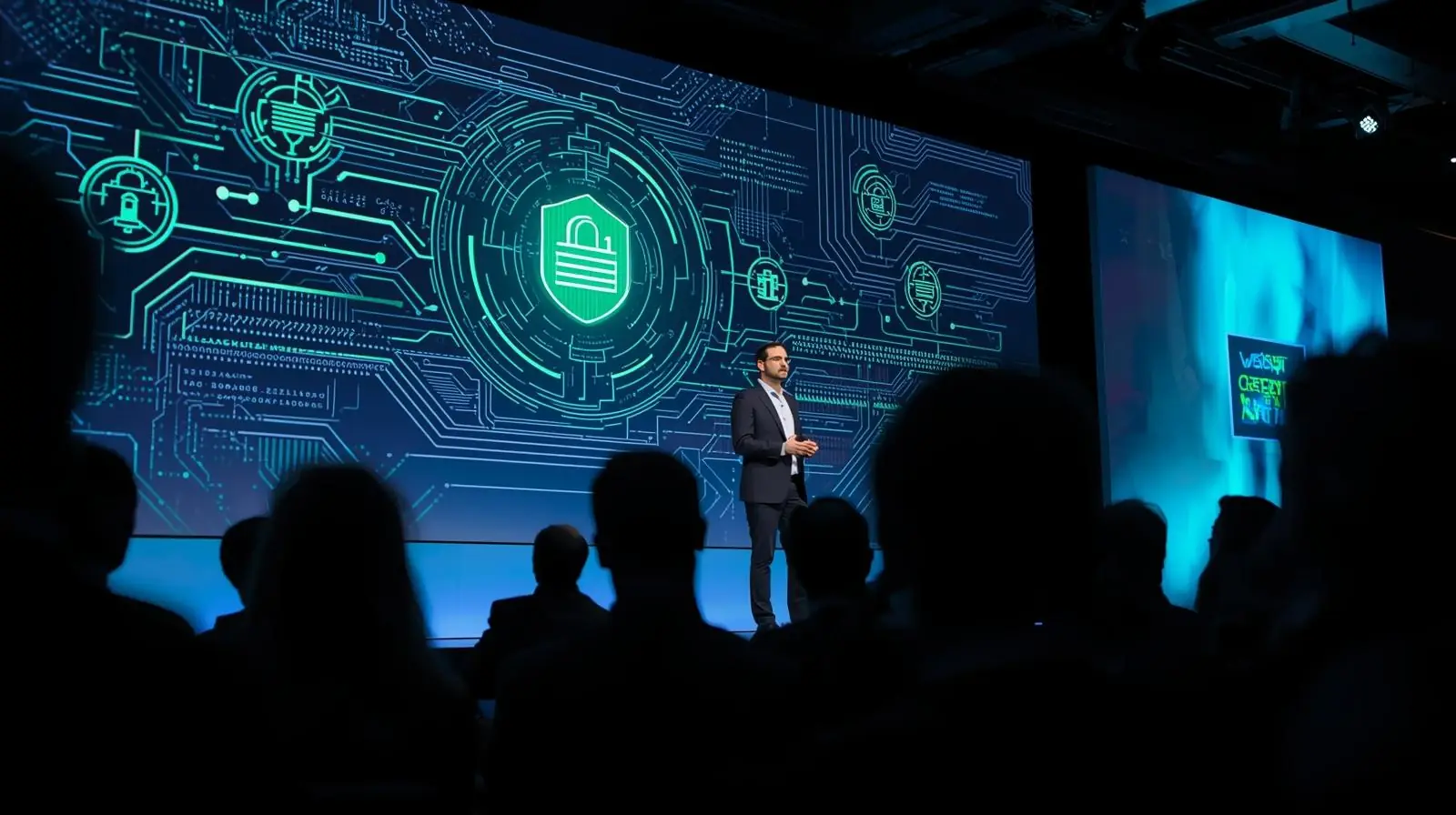
August 28, 2025Why Relatable Leaders Build Stronger Teams (And How You Can Become One)
Discover engagement strategies fom expert Rachel DeAlto on how leaders can become more relatable and transform their workforce for the better.
What if the most powerful leadership tool you possess isn’t your expertise, your title, or your strategic vision—but your ability to make others feel truly understood? In a world where 70% of employees report feeling disengaged at work, the leaders who stand out aren’t necessarily the smartest in the room. They’re the most relatable.
This fundamental shift in leadership thinking comes from relatable keynote speaker Rachel DeAlto, a communication expert, former attorney, and researcher who has dedicated her career to understanding what makes leaders truly connect with their teams. Through her work with Fortune 500 companies and her role as Chief Connection Officer at Match Group, Rachel has discovered that relatability isn’t just a nice-to-have soft skill—it’s the cornerstone of effective leadership in the modern workplace.
In this exploration of relatable leadership, we’ll uncover why traditional leadership models fall short, how authenticity drives real results, and practical strategies you can implement immediately to become a more relatable leader. Whether you’re an introvert who thinks relatability is reserved for extroverts or a seasoned leader looking to deepen team connections, this guide will transform how you approach leadership entirely.
? Watch and listen to the podcast episode: YouTube • Spotify • Apple Podcasts • Amazon Music
The Relatability Myth That’s Holding Leaders Back
One of the most persistent misconceptions in leadership circles is that relatability is an extroverted trait—that you need to be naturally outgoing, charismatic, and socially energetic to connect with others. This myth has prevented countless capable leaders from recognizing their own potential for building meaningful relationships with their teams.
Rachel DeAlto challenges this assumption head-on. “Everyone can become more relatable—whether you’re an introvert or an extrovert. The key is how you make people feel,” she explains. This insight revolutionizes our understanding of what it means to be a relatable leader.
The difference lies not in personality type, but in approach. Where extroverted leaders might naturally engage through energy and enthusiasm, introverted leaders can leverage their natural tendencies toward deep listening, thoughtful responses, and one-on-one connections. The goal isn’t to change your personality—it’s to understand how your authentic self can create genuine connections with others.
Research supports this perspective. Studies in organizational psychology show that employees value leaders who demonstrate genuine interest in their wellbeing, remember personal details about their lives, and create space for authentic dialogue. These behaviors aren’t exclusive to any personality type; they’re skills that can be developed by anyone committed to becoming more relatable.
For introverted leaders specifically, Rachel offers practical advice: “Be curious, not judgmental.” This simple framework transforms networking events, team meetings, and casual interactions from energy-draining obligations into opportunities for meaningful connection. Instead of focusing on what you should say next, concentrate on learning something new about the person you’re speaking with. This shift in focus removes pressure while naturally building the foundation for relatable leadership.
The Science Behind What Makes Leaders Relatable
Understanding relatability requires diving into the psychological mechanisms that drive human connection. Rachel’s background in psychology and extensive research reveals that relatability operates on multiple levels, creating a framework that leaders can consciously develop and apply.
At its core, relatability functions through what researchers call “emotional mirroring”—our natural tendency to sync with the emotions and energy of those around us. When leaders demonstrate vulnerability, authenticity, and genuine interest in others, they trigger this mirroring response, creating an environment where team members feel psychologically safe and emotionally connected.
The neuroscience behind this process is fascinating. When we encounter someone we perceive as relatable, our brains release oxytocin—often called the “trust hormone.” This chemical reaction doesn’t just make us feel good; it enhances collaboration, increases empathy, and improves communication quality. In practical terms, this means that relatable leaders aren’t just more likeable—they’re actually creating the optimal biological conditions for team performance.
Rachel’s research identifies three key components that make leaders relatable: authenticity, curiosity, and intentionality. Authenticity involves showing up as your genuine self rather than hiding behind a leadership persona. Curiosity means maintaining genuine interest in understanding others’ perspectives and experiences. Intentionality requires being deliberate about how your actions and words impact others.
These components work together to create what Rachel calls “connection moments”—brief interactions that build trust and understanding over time. A connection moment might be as simple as remembering a team member’s weekend plans and asking about them on Monday, or as significant as sharing your own struggles with a challenge the team is facing.
The research is clear: teams led by relatable leaders show measurably higher levels of engagement, creativity, and retention. They also demonstrate greater resilience during challenging periods and more effective communication across all levels of the organization.
Your Framework for Building Relatable Leadership Skills
Becoming a more relatable leader isn’t about completely reinventing yourself—it’s about developing specific skills and approaches that enhance your natural ability to connect with others. Rachel DeAlto’s framework provides a systematic approach that any leader can implement, regardless of their starting point or personality type.
The foundation of this framework begins with self-awareness. Before you can authentically connect with others, you need to understand your own communication style, emotional triggers, and natural strengths. This isn’t about cataloging your weaknesses; it’s about recognizing how you naturally show up in relationships and how others experience your presence.
Consider conducting a personal audit of your recent interactions. When have you felt most connected to team members? What were the circumstances that created those moments? Often, we discover that our most relatable moments happen when we’re not trying to be someone else, but when we’re fully present and genuinely engaged with the person in front of us.
The next component involves developing what Rachel calls “strategic vulnerability.” This doesn’t mean oversharing personal details or displaying emotional instability. Instead, it means selectively sharing experiences, challenges, and insights that help others see you as human while maintaining appropriate professional boundaries.
Strategic vulnerability might involve sharing a professional mistake you made and what you learned from it, discussing a skill you’re working to develop, or acknowledging when you don’t have all the answers. These moments of honesty create psychological safety for team members to be equally authentic, fostering an environment where real connection can flourish.
Active curiosity forms the third pillar of relatable leadership. This goes beyond surface-level interest to genuine engagement with others’ perspectives, experiences, and ideas. Relatable leaders ask follow-up questions, remember details from previous conversations, and demonstrate that they value team members as complete individuals, not just employees.
Finally, the framework emphasizes intentional impact—being conscious of how your words, actions, and presence affect others. This awareness allows you to adjust your approach based on the needs of different team members while remaining authentic to your core values and communication style.
How You Show Up Matters More Than What You Say
The most relatable leaders understand that presence often speaks louder than words. How you enter a room, engage in conversations, and respond to challenges communicates volumes about your character and priorities. This nonverbal dimension of leadership often determines whether team members see you as approachable and trustworthy or distant and intimidating.
Rachel emphasizes that showing up authentically doesn’t mean being unprofessional or abandoning leadership responsibilities. Instead, it means bringing your full self to leadership moments while maintaining the boundaries and standards necessary for effective management. This balance requires conscious intention and ongoing practice.
Consider how you typically begin meetings. Do you rush in focused on the agenda, or do you take a moment to acknowledge the people in the room? Relatable leaders often start with genuine check-ins—not just “How is everyone?” but specific questions that show they’ve been paying attention to team members’ lives and challenges.
The way you handle mistakes and setbacks also significantly impacts your relatability. Leaders who can acknowledge errors, show genuine remorse when appropriate, and demonstrate learning from difficulties create psychological safety for their teams to take risks and innovate. This vulnerability doesn’t undermine authority; it enhances it by showing that leadership involves continuous growth and learning.
Your physical presence matters too. Relatable leaders make eye contact, practice active listening, and use body language that invites rather than intimidates. They position themselves as part of the team rather than above it, while still maintaining the clarity of roles and expectations that effective leadership requires.
The key insight Rachel shares is that relatability isn’t about being everyone’s friend—it’s about being genuinely interested in everyone’s success. This distinction allows leaders to maintain necessary boundaries while still creating the connection that drives engagement and performance.
The Power of Intentional Leadership Impact
Truly relatable leaders operate with a clear intention about the impact they want to create. They understand that every interaction is an opportunity to either build or diminish connection, and they approach their leadership responsibilities with this awareness guiding their choices.
Rachel’s work reveals that intentional leaders start by identifying their core drivers—the values and purposes that motivate their leadership approach. When you’re clear about why you lead and what kind of culture you want to create, your actions become more consistent and authentic. Team members can sense this clarity, and it contributes significantly to your relatability.
This intentionality extends to how you handle difficult conversations, provide feedback, and navigate conflict. Relatable leaders don’t avoid these challenging moments; instead, they approach them with clear intention to preserve relationships while addressing necessary issues. They prepare not just what they’ll say, but how they’ll create an environment where honest dialogue can occur.
The research on intentional leadership shows remarkable results. Teams with intentionally relatable leaders demonstrate higher levels of psychological safety, increased innovation, and better customer experience outcomes. These leaders create ripple effects that extend far beyond their immediate teams, influencing organizational culture and business results.
Intentional relatability also means being strategic about when and how you share aspects of your personal experience. Effective leaders understand that their stories and vulnerabilities should serve their team’s development rather than their own need for connection. This purposeful approach to sharing builds trust without crossing professional boundaries.
Furthermore, intentional leaders actively seek feedback about their relatability and impact. They create systems for understanding how team members experience their leadership style and make adjustments based on this input. This continuous improvement approach demonstrates the humility and growth mindset that characterize truly relatable leaders.
Everyone Has Relatable Leadership Potential
One of the most transformative insights from Rachel DeAlto’s research is that relatability isn’t a fixed trait—it’s a set of skills that can be developed by anyone willing to invest in authentic connection with others. This democratization of relatable leadership means that regardless of your current comfort level with interpersonal relationships, you have the potential to become a more connected and effective leader.
The journey begins with recognizing the relatable qualities you already possess. Perhaps you’re an excellent listener, have a talent for remembering details about others’ lives, or naturally create inclusive environments. These existing strengths provide the foundation for developing broader, relatable leadership skills.
Many leaders underestimate their relatability because they compare themselves to more extroverted colleagues or hold misconceptions about what connection looks like in professional settings. Rachel’s work shows that some of the most relatable leaders are those who initially doubted their ability to connect—their journey of growth and self-discovery becomes part of what makes them authentic and approachable.
The development process involves practice and reflection. Start with low-stakes interactions where you can experiment with different approaches to connection. Notice what feels natural and authentic versus what feels forced or performative. Pay attention to how others respond to your efforts and adjust accordingly.
Building relatable leadership skills also requires patience with yourself and others. Connection takes time to develop, and not every interaction will result in immediate rapport. The goal is to create consistent patterns of authentic engagement that build trust and understanding over time.
Remember that relatability doesn’t require perfection. In fact, leaders who are too polished or seem to have everything figured out can actually be less relatable than those who show appropriate vulnerability and humanity. Your struggles, learning moments, and genuine care for others’ success are often what make the deepest connections possible.
Standing Out Through Authentic Connection
In an increasingly digital and fast-paced business environment, the ability to create genuine human connection has become a significant competitive advantage. Relatable leaders stand out not because they’re trying to be different, but because they’re committed to being authentically themselves while genuinely caring about others’ success and wellbeing.
Rachel’s latest book, “The Relatable Leader,” explores how this authenticity creates differentiation in crowded markets and competitive environments. When customers, employees, and stakeholders have countless options, they choose to work with people and organizations that make them feel understood, valued, and connected.
This principle applies equally to internal team dynamics and external relationships. Employees stay with organizations where they feel genuinely connected to their leaders and colleagues. Customers remain loyal to companies that understand their needs and communicate with authenticity rather than corporate speak.
The challenge many leaders face is balancing authenticity with professionalism. They worry that being too relatable might undermine their authority or create inappropriate boundaries. Rachel’s framework addresses this concern by emphasizing that relatability enhances rather than diminishes leadership effectiveness when applied with intention and wisdom.
Standing out through authentic connection also means being willing to have difficult conversations with empathy and care. Relatable leaders don’t avoid challenging topics; they approach them in ways that preserve dignity and demonstrate genuine concern for all parties involved. This approach to conflict resolution and problem-solving creates deeper trust and respect than avoiding issues or handling them impersonally.
The most successful relatable leaders also understand that authenticity requires consistency across different contexts. They show up with the same core values and caring approach, whether they’re in the boardroom, at a company social event, or having a one-on-one conversation with a struggling team member. This consistency builds trust and makes others feel safe to be authentic in return.
Creating Ripple Effects Beyond Your Direct Team
The impact of relatable leadership extends far beyond immediate team dynamics. When leaders prioritize authentic connection, they create cultural changes that ripple throughout entire organizations and influence how those organizations interact with customers, partners, and communities.
Team members who experience relatable leadership often become more relatable themselves. They learn by example how to balance authenticity with professionalism, how to create psychological safety for others, and how to approach relationships with genuine curiosity and care. This multiplication effect means that investing in your own relatability skills can transform entire organizational cultures.
The customer experience benefits are particularly significant. Teams led by relatable leaders demonstrate higher levels of empathy and emotional intelligence in their customer interactions. They’re better at understanding customer needs, communicating solutions effectively, and creating the kind of memorable experiences that drive loyalty and referrals.
Rachel’s research with various industries shows that companies with relatable leadership cultures also attract and retain better talent. Potential employees can sense authentic cultures during interview processes, and current employees become advocates who attract like-minded professionals to the organization.
The ripple effects also extend to innovation and creativity. When team members feel psychologically safe and genuinely valued, they’re more willing to share ideas, take calculated risks, and collaborate effectively. This environment of trust and authentic connection becomes a competitive advantage in markets that reward innovation and agility.
Perhaps most importantly, relatable leaders often inspire others to become leaders themselves. By demonstrating that leadership isn’t about having all the answers or maintaining emotional distance, they show team members that leadership is accessible and that everyone has something valuable to contribute to organizational success.
From Applause to Lasting Action
The ultimate measure of relatable leadership isn’t how much people like you—it’s how much your authentic connection inspires them to grow, contribute, and achieve goals they didn’t think possible. Rachel DeAlto’s work reveals that the most impactful leaders create what she calls “wonder” rather than just “happiness” in their interactions with others.
Happy moments make people clap, but wonder moments make them change. This distinction is crucial for leaders who want to move beyond surface-level popularity to create lasting transformation in their teams and organizations. Wonder comes from helping others see new possibilities for themselves and their work, from challenging them to grow while providing the support they need to succeed.
Creating wonder through relatable leadership requires moving beyond transactional relationships to transformational ones. This means investing time in understanding each team member’s aspirations, challenges, and unique contributions. It means providing feedback and guidance that helps them develop capabilities they didn’t know they possessed.
The transformation from applause to action often happens through storytelling and shared vision. Relatable leaders help team members see how their individual contributions connect to larger purposes and outcomes. They share stories of growth and possibility that help others envision their own potential for development and impact.
This approach to leadership requires patience and long-term thinking. Building the kind of authentic relationships that inspire lasting change takes time and consistent effort. However, the results—increased engagement, innovation, and organizational resilience—justify the investment in ways that more traditional command-and-control approaches cannot match.
The most relatable leaders also understand that their role includes preparing others to lead. They actively develop and mentor emerging leaders, sharing not just technical skills but the relationship and communication capabilities that make leadership sustainable and fulfilling.
The Relatable Leader’s Daily Practice
Becoming a relatable leader requires more than understanding concepts—it demands consistent daily practices that reinforce authentic connection and intentional impact. Rachel DeAlto’s approach emphasizes small, consistent actions that build relational capital over time rather than dramatic gestures that might feel performative or unsustainable.
The practice begins each morning with intention-setting. Before diving into tasks and meetings, relatable leaders take a few minutes to consider how they want to show up that day, which team members might need extra support or recognition, and what opportunities exist for meaningful connection within their scheduled activities.
Throughout the day, they practice what Rachel calls “micro-connections”—brief moments of genuine engagement that acknowledge others’ humanity and contributions. This might involve asking about a project someone mentioned they were working on, remembering a personal detail from a previous conversation, or simply making eye contact and offering authentic appreciation for someone’s efforts.
Relatable leaders also prioritize active listening in all their interactions. They resist the urge to multitask during conversations, ask follow-up questions that demonstrate genuine interest, and reflect back what they’ve heard to ensure understanding. These listening skills create space for others to feel truly heard and valued.
End-of-day reflection forms another crucial component of the relatable leader’s practice. They consider which interactions went well, where they might have missed opportunities for connection, and what they learned about their team members’ needs and aspirations. This reflection informs their approach to future interactions and helps them continuously improve their relational effectiveness.
The daily practice also includes seeking feedback about their leadership impact. Relatable leaders create informal and formal mechanisms for understanding how others experience their leadership style, and they make adjustments based on this input. This commitment to continuous improvement demonstrates the humility and growth mindset that characterize authentic leaders.
Measuring the Impact of Relatable Leadership
While the benefits of relatable leadership might seem intangible, research shows that authentic connection produces measurable results across multiple organizational metrics. Understanding these outcomes helps leaders justify their investment in relationship-building and track their progress over time.
Employee engagement scores consistently improve under relatable leadership. Team members report higher levels of job satisfaction, increased commitment to organizational goals, and greater willingness to recommend their workplace to others. These engagement improvements translate directly into reduced turnover costs and increased productivity.
Innovation metrics also show significant improvement when leaders prioritize authentic connection. Teams with relatable leaders generate more creative solutions, are more willing to experiment with new approaches, and demonstrate greater resilience when initial attempts don’t succeed. This innovation capacity becomes particularly valuable in rapidly changing business environments.
Customer satisfaction and loyalty measures reflect the ripple effects of relatable leadership as well. Teams that experience authentic leadership often provide more empathetic and effective customer service, leading to improved customer retention and positive word-of-mouth referrals.
The financial impact of relatable leadership extends to revenue growth and profitability as well. Organizations with highly engaged employees—often the result of relatable leadership—show 23% higher profitability, 18% higher productivity, and 12% better customer metrics according to Gallup research.
Perhaps most importantly, relatable leaders create sustainability in their organizations. Teams led by authentic, connecting leaders demonstrate greater resilience during challenging periods, more effective adaptation to change, and stronger collaborative relationships that support long-term success.
The Future of Relatable Leadership
As workplaces continue to evolve, the importance of relatable leadership will only increase. Remote work, generational diversity, and increased emphasis on employee well-being all point toward a future where authentic connection becomes even more crucial for leadership success.
The leaders who thrive in this environment will be those who can create genuine relationships across digital platforms, bridge generational and cultural differences through empathy and understanding, and maintain human connection in increasingly automated and efficient business processes.
Rachel DeAlto’s research suggests that the next generation of employees particularly values authentic leadership. They want to work for leaders who see them as whole people rather than just resources, who demonstrate vulnerability and humanity, and who create environments where everyone can contribute their unique perspectives and talents.
This shift requires leaders to develop new skills in digital communication, cross-cultural competence, and emotional intelligence. However, the foundation remains the same: genuine care for others’ success and wellbeing, authenticity in all interactions, and intentional effort to create connection and understanding.
The organizations that invest in developing relatable leadership capabilities now will have significant advantages in attracting talent, serving customers, and adapting to future challenges. Relatability isn’t just a leadership nice-to-have—it’s becoming a business imperative for sustainable success.
Your Journey to Relatable Leadership Starts Now
The path to becoming a more relatable leader begins with a simple but powerful commitment: to show up authentically and genuinely care about the success and well-being of those around you. This commitment doesn’t require a personality transplant or years of training—it requires intention, practice, and the willingness to be genuinely human in your professional relationships.
Start by identifying your natural relatable qualities and building from there. Notice when you feel most connected to others and what circumstances create those moments. Pay attention to how others respond when you’re being most authentic, and let those positive responses guide you toward more consistent, relatable behaviors.
Remember that becoming a relatable leader is a journey, not a destination. You’ll have moments of great connection and others where you fall short of your intentions. The key is to approach this development with the same curiosity and growth mindset you want to see in your team members.
The investment you make in developing relatable leadership skills will pay dividends throughout your career and create positive ripple effects that extend far beyond your immediate sphere of influence. In a world that often feels increasingly disconnected, leaders who can create genuine human connections become invaluable assets to their organizations and communities.
Most importantly, remember that your unique combination of experiences, perspectives, and natural qualities makes you capable of being relatable in ways that no one else can replicate. The goal isn’t to become someone else—it’s to become the most authentic and connecting version of yourself.
The world needs more leaders who can bridge differences, create psychological safety, and inspire others to achieve their best work through genuine care and connection. You have the potential to be one of those leaders, starting with your very next interaction.
Ready to Transform Your Leadership Through Authentic Connection?
The journey to becoming a more relatable leader starts with understanding how authentic connection can transform your team’s performance and your organization’s culture. Whether you’re looking to improve employee engagement, enhance customer relationships, or build a more resilient and innovative team, the principles and practices outlined in this guide provide a roadmap for meaningful change.
Consider bringing relatable keynote speaker Rachel DeAlto to your next event to help your audience discover their own potential for creating powerful connections that drive results.
Book a 15-minute discovery call to discuss how relatable leadership can address your organization’s specific challenges and opportunities.
Explore more speakers who specialize in leadership development, communication, and organizational transformation to build a comprehensive learning experience for your team.
Discover More Insights
Get in TouchContact US
Fill out the form so we can best understand your needs.
A representative from The Keynote Curators will reach out to you.








